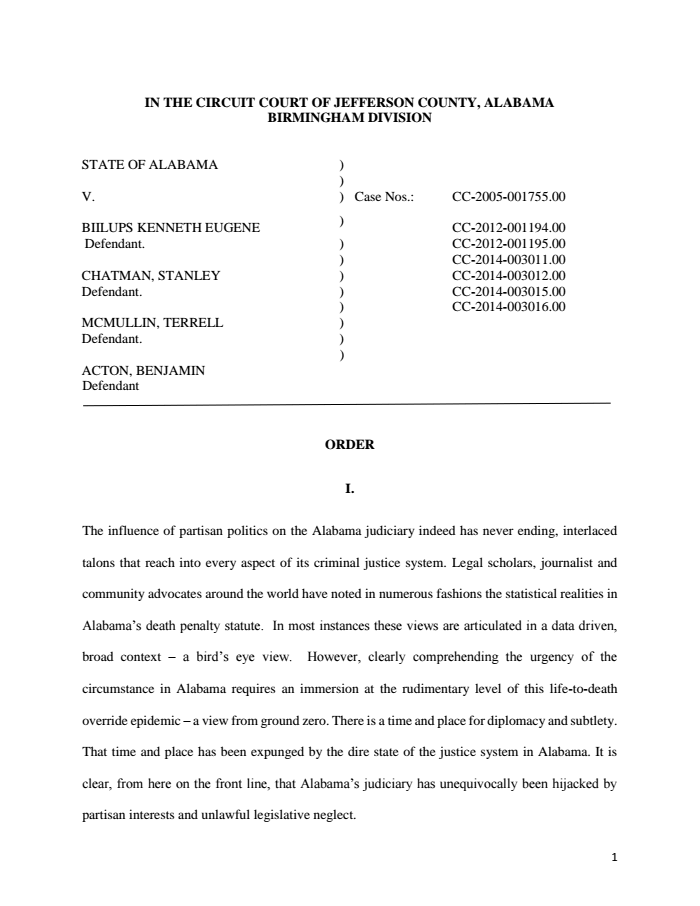
A state trial court judge in Alabama on Thursday ruled from the bench that the state's death sentencing law is unconstitutional in a challenge brought by four capital murder defendants.
Jefferson County Circuit Judge Tracie Todd followed up hours later with a stark written ruling attacking the implementation of the death penalty in the state.
"There is a time and place for diplomacy and subtlety. That time and place has been expunged by the dire state of the justice system in Alabama," Todd wrote in her ruling, issued Thursday afternoon. "It is clear, from here on the front line, that Alabama’s judiciary has unequivocally been hijacked by partisan interests and unlawful legislative neglect."
The news of Todd's bench ruling was first reported by AL.com earlier Thursday. The ruling came in response to a hearing sought by capital murder defendants Benjamin Acton, Terrell McMullin, Stanley Chatman, and Kenneth Billups.
Todd concluded that Alabama's death sentencing scheme is similar enough to the Florida scheme struck down in January by the U.S. Supreme Court that it, too, violates the Sixth Amendment constitutional right to a trial by jury.
In the Florida case, the Supreme Court ruled in Hurst v. Florida that the state's sentencing scheme was unconstitutional because the state relied on “a judge’s factfinding” and not “a jury’s verdict” to sentence a person to death.
Specifically, Todd detailed how the Alabama system is, in her view, more constitutionally troubling than Florida's system due to the fact that judges in Alabama often override life sentences recommended by juries in capital cases, choosing instead to impose death sentences.
"At present Alabama is solitary in its unbridled system of allowing judges to deviate from jury advisory verdicts in order to effect life-to-death sentence overrides," Todd noted, later explaining, "The consequence of the judicial override has raised flags among legal circles for several decades."
Todd went on to note, "Approximately twenty-one percent of the 199 people on death row were sentenced to death through judicial override."
In conclusion, Todd wrote, "A jury’s recommendation of a life sentence based on a finding that the requisite aggravating factors have been proven beyond a reasonable doubt, and that the mitigating circumstances outweigh these factors, should remain undisturbed. ... More importantly, capital defendants in Alabama are subject to having the 'maximum authorized punishment...increased by a judge’s own factfinding.' In light of the ruling in Hurst, Alabama’s capital sentencing scheme, 'under which an advisory jury makes a recommendation to a judge, and the judge makes critical findings needed for the imposition of a death sentence, violates the Sixth Amendment right to trial by jury.'"
Todd, however, went beyond the ruling in Hurst, finding systematic and pervasive problems throughout Alabama's system.
"[T]he imposition of the death penalty in Alabama by biased judges, improperly assigning criminal cases, and appointing counsel based on political motivation is in direct violation of the Fifth, Sixth and Fourteenth Amendments to our Constitution," Todd wrote.
Further still, Todd found that state funding decisions — regarding representation and other parts of the judicial process — are insufficient to provide adequate safeguards and procedures.
"Alabama’s unlawful defunding of the judicial branch is in itself a violation of the Alabama Constitution of 1901," Todd wrote. "More importantly, the effects of this underfunding cause violations of the Fifth, Sixth, Eighth, and Fourteenth Amendments of the United States Constitution in one form or another."
In concluding her 28-page ruling, Todd found that "the death penalty in Alabama is being imposed in a 'wholly arbitrary and capricious' manner" and quoted Martin Luther King, Jr.: "This is no time for apathy or complacency. This is a time for vigorous and positive action."

